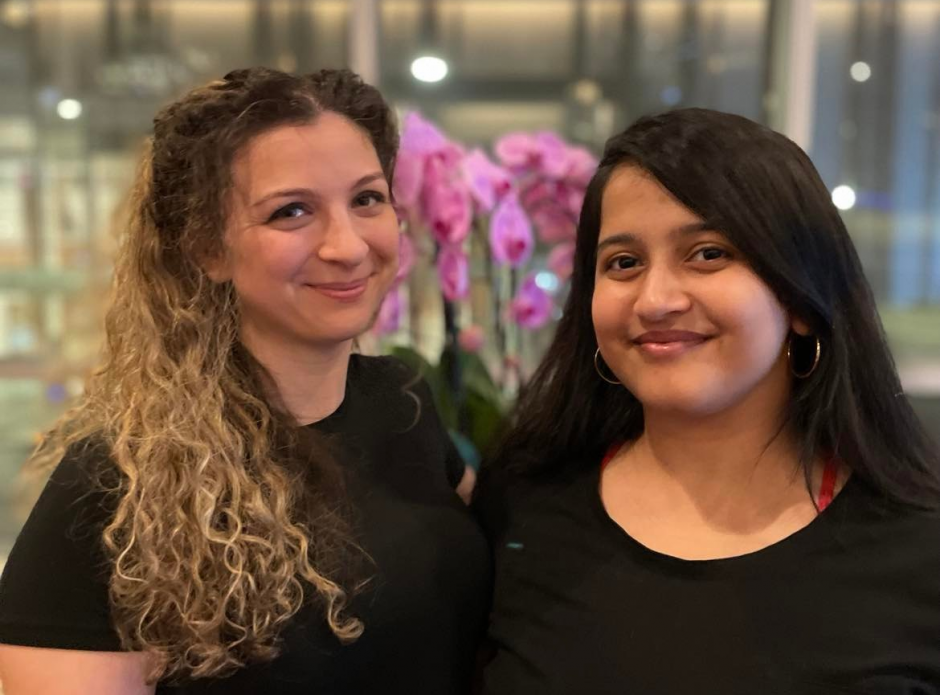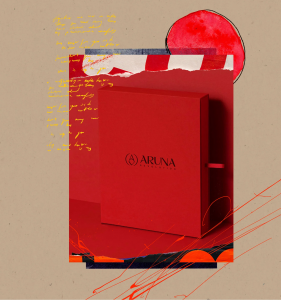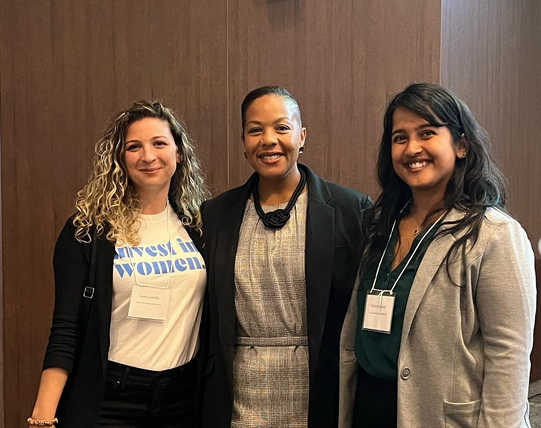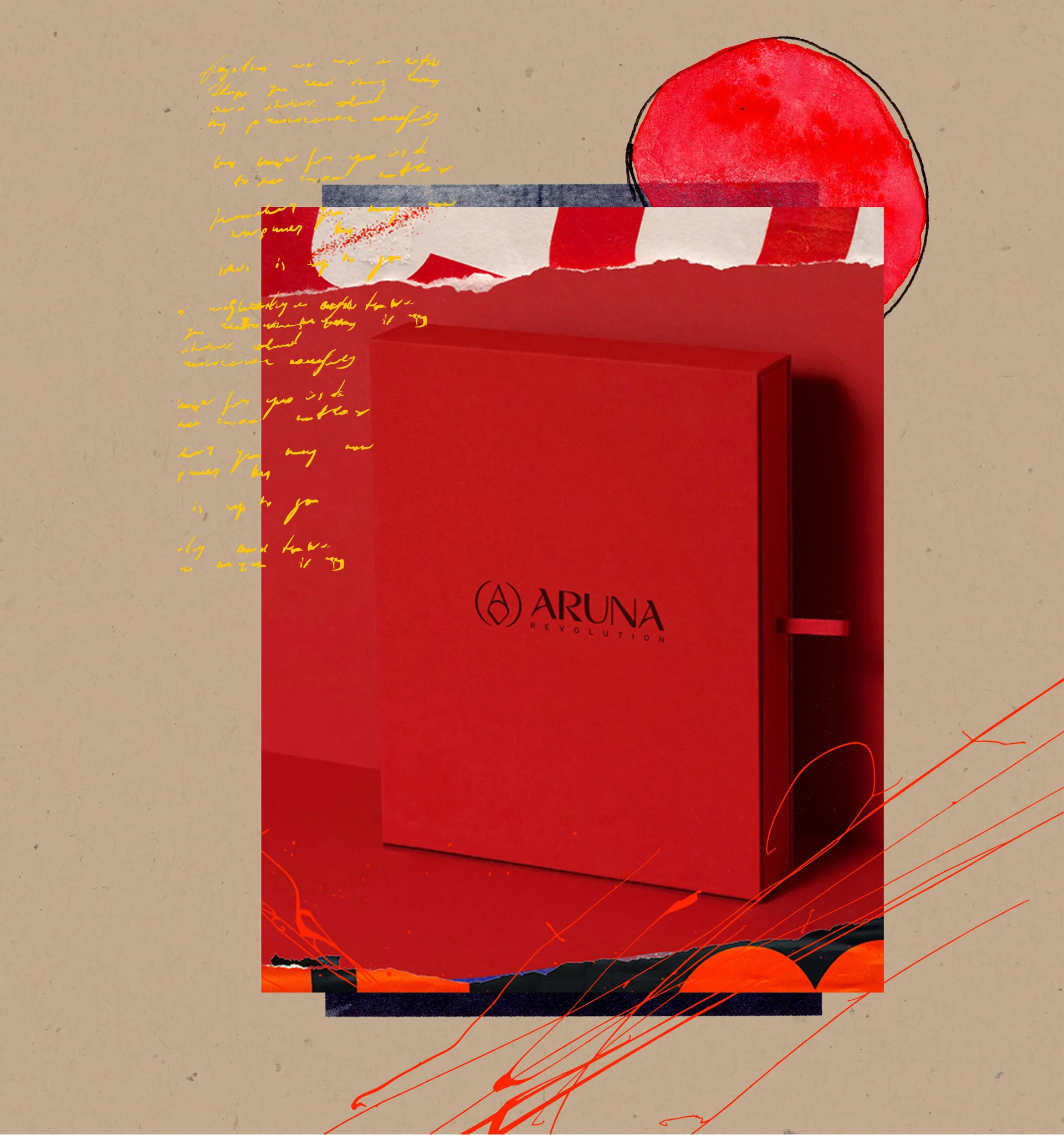Going Against the Flow: Aruna Revolution’s Mission to Transform Periods and the World

Photos courtesy of Rashmi Prakash, Lanna Last, and Aruna Revolution
When it comes to the menstrual product industry, we’ve largely agreed to go with the flow; over the past few decades, brands and product researchers have come out with thinner materials, more absorbent weaves, and updated, body-fitting designs. However, most of these are iterations of the same few products that weren’t developed with long-term sustainability in mind.

That’s why UBC-born Aruna Revolution is stepping up to disrupt the status quo.
Co-founders Lanna Last and Rashmi Prakash set out to innovate, empower, and transform through their vision for Aruna Revolution. They understood that we can’t stop using menstrual products, as they are necessary and essential health items, but we can change what we use to lower our impact on the environment.
By engineering 100% compostable menstrual pads, Lanna and Rashmi are taking that first step in making period products more environmentally responsible. After many rounds of design and material experimentation, Rashmi—who is an adjunct professor at UBC—landed on repurposed food waste fibres as a two-in-one solution.
Lanna and Rashmi’s short-term goals are to set up their local manufacturing facility, get feedback on their menstrual pads, and find a pathway to a successful launch. Beyond that, these two friends and co-founders are on a mission to change the world. They have loftier long-term goals to empower women* and all menstruators, increase accessibility to period products, and reduce the amount of period- and food-related waste that ends up in the landfill.
“With Aruna Revolution, not only do we want to provide affordable menstrual pads that are better for the body and the planet, we also want to destroy the stigma surrounding periods by increasing the education and awareness around it. Having a period can be challenging, and we want to educate everyone to make sure that they all have the knowledge and courage to access the healthcare they need to manage their periods (or support the people in their live who have them).”
— Aruna Revolution
After all, Rashmi has mentioned in a previous interview that a lot of her meetings with potential funders have inevitably led to dismissive behaviour or questions about why we need to innovate at all. It’s the “this is such a ‘normal’ thing that we don’t need to change the way we’ve been doing things” mentality that both Rashmi and Lanna are hoping to combat.

“I understand that it’s not coming from a malevolent place, but rather a failure of education. Far too often, men* tend to have no idea the many of the problems women* face. So I see this as a teaching opportunity. However, it is incredibly frustrating, especially considering that the start-up and funding space is dominated by men who don’t understand the problem [and don’t open their minds to understanding it]. But that’s why we started Aruna: we want to shine a light the problem and be the innovators and voice for so many women and menstruators so that we can truly empower them. It is now up to us and the work we do at Aruna Revolution and [those who share our values] to lay the groundwork for tomorrow.”
— Rashmi Prakash
Since Aruna Revolution’s products are not yet ready to launch to market and the company itself is technically still in its early years, they are up against some big but addressable challenges. In particular, Aruna is frustrated by how much “greenwashing” exists in personal health marketing, including in the period product industry, and wants to inform people on how to spot false or misleading information around terminology and claims. Their gripe is that brands can spin their marketing to lead customers to think that “biodegradable” is the same as “compostable,” when the truth is that calling a material biodegradable does not carry the burden of proving that the material will re-enter the nutrient cycle after being broken down. Moreover, although biodegradation is better than no degradation at all, but it still takes hundreds of years for products to degrade in perfect conditions. (Biodegradable products in a landfill take much more time to degrade; by comparison, Aruna’s pads will be able to eliminate waste and help plants and other organic materials grow by adding themselves to compost systems at any scale.) Even though the practice of marketing biodegradable products as environmentally friendly is technically not illegal, nor is it completely inaccurate, it often draws on greenwashing to lure people into thinking we’re purchasing products that are more sustainable than they actually are in practice.

Rashmi, Lanna, the Aruna team, and their funders and partners don’t believe that innovation and sustainability are separate spheres. In fact, if we apply the right mindset, innovation and sustainability actually complement one another. It is, however, incredibly frustrating to cut through the fearmongering, greenwashing, and pseudoscience. Far too many companies claim to be “green,” (which is an unregulated term, whether we’re talking about food or cosmetics or period products), and far too many people have been too easily sold by underhanded greenwashing.
This is where Rashmi sees relevant, direct, and scientific communication coming into play to bridge the gap between consumers and a true understanding of the impact of their choices. Many researchers and students in the STEM world still struggle to communicate the impact and relevance of their research and work, and Aruna wants to support this by turning their scientific literature into language that the general public can digest and sharing this information with their audience through social media and their educational blog posts.
For Rashmi specifically, STEM education has helped her feel confident in her ability to transform the world around her. Growing up, she watched the massive amount of problems my parents were able to solve, without even a degree. Rashmi’s dad is the best engineer she knows, and he got his engineering degree in his late 40s, and this type of drive that she witnessed from both her parents has spurred her can-do attitude. Problem solving, building, and sustainability were core parts of her childhood. In addition to this, Rashmi watched many people whom loved struggle to manage their health, so she was motivated to be in the biomedical world. STEM is so important to Rashmi because it’s allowed her to see the world from a different perspective and to help and enable people in ways that she would not have if she didn’t have her education.
“Science and engineering have given me the tools I need to build the world I want to live in for myself and others,” Rashmi shares.
One of the challenges that Aruna has experienced is that a lot of people have suggested compromises—like putting in “just” 3% plastic, or “just” compromising on one of the layers, or using a chemical that is “only slightly carcinogenic”—so it has been an uphill trek for Rashmi and Lanna to find funders who are also unwilling to budge on their values of sustainability, inclusivity, and education.
“To us, when we compromise on this, we compromise what we believe in, and we compromise on the quality of product that we deserve and that we want to give to our family, friends, and all menstruators. Beyond just this project, compromise seems to be historically expected of women…for example, the default expectation is for us to compromise our career dreams and often financial independence to take care of children.
We refuse to compromise, and refuse to ask others to compromise their health.
It’s taken time to find partners who believe in our mission, and people in the manufacturing world who really understand it (largely due to it being dominated by men). But when we do find the right people (and we have found many now!), everything shifts into place.”
— Aruna Revolution

As well, Aruna hopes to shift the way the menstrual product industry is structured, led, and run. Ideally, manufacturers should clearly state where their products are manufactured, list all materials they use, and disclose residual chemicals (many of which are scientifically known to be carcinogenic!) in their products. Aruna would also like to see more funding for women* founders, as those are the people who have first-hand experience of menstruation and can provide a more complete and diverse perspective on everything from product design and leadership to networking and marketing. As demonstrated by Rashmi and Lanna’s experience with venture capital meetings, we still face gaps when it comes to who holds the money and decision-making powers for such critical healthcare matters.
Finally, Aruna Revolution wants to see more menstrual health and menstrual health product education and the destigmatization of conversations around these topics (many of the men* in the venture capital world have no idea how challenging periods are and how much people want better and more affordable products!)
So what’s next for Aruna Revolution?
A smaller initiative that Aruna is hoping to achieve is to get the 500 signatures they need to table a petition on period equity that Lanna Last helped create. Aruna wants to help change the way we talk about and educate on menstruation and open up more dialogue in order to make way for fair access, scientific approaches, and higher quality of life.
Firstly, Aruna wants to lower the barrier, whether in terms of accessibility or affordability, for disadvantaged communities to have period products. Secondly, through their circular economy production strategy, Aruna’s target is to lower waste and further bolster the environment by getting their compostable pads in as many hands as possible…and encouraging people to compost them after use.
Aruna is currently in the stages of getting their product certified for safety and compostability, and they’re also awaiting the results of the Food Waste Reduction Challenge to see if they will win an additional $1 million in project funding. With this in mind, their key target is to launch their pads in the next two years to ensure that all menstruators who need access to pads will have them. To accomplish this, Aruna will work with businesses to support providing pads to everyone. After this, Aruna will move their way south of Canada. Lanna and Rashmi see immense value in helping American women and menstruators to bolster their own economy and empower them as business owners, have better access to period products, and contribute less to environmental waste.
Lanna and Rashmi hope that Aruna Revolution will be a revolution for young women and people who menstruate to see themselves in a new light—that they can be the change they want to see in the world—and they hope to be one of the leading examples of that.
* In this content, the speaker uses “men” and “women” to denote cis-men and cis-women.

May 28, 2023 is World Menstrual Hygiene Day.
Spread the message, be part of the movement towards equitable health access, and learn more about menstrual health.
Get involved with Aruna Revolution and add your name to the waitlist for their 100% compostable pad launch.


